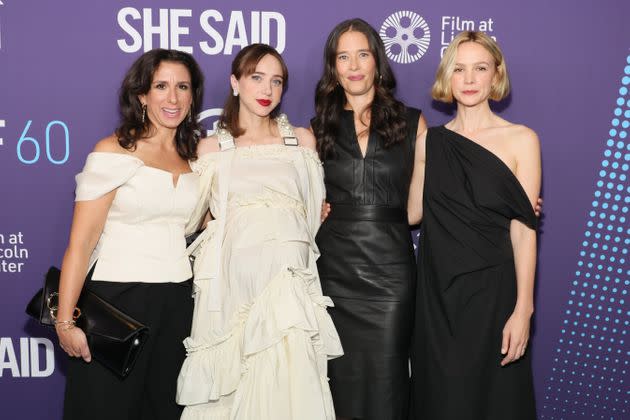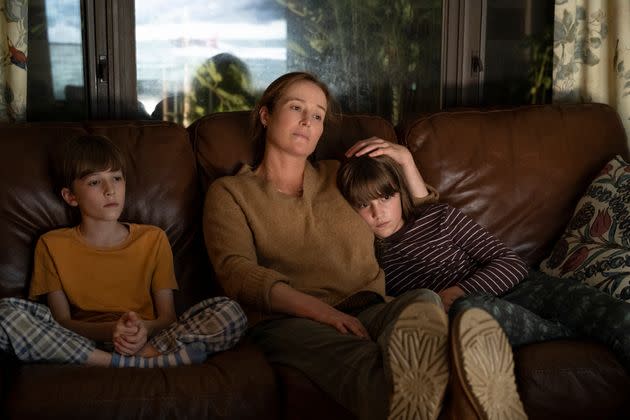The Movie 'She Said' Could Be A Valuable Public Service In A Time Of Media Distrust
- Oops!Something went wrong.Please try again later.
- Oops!Something went wrong.Please try again later.
- Oops!Something went wrong.Please try again later.

Carey Mulligan as Megan Twohey (left) and Zoe Kazan as Jodi Kantor in "She Said," directed by Maria Schrader. (Photo: JoJo Whilden/Universal Pictures)
About three-quarters of the way into the movie “She Said,” New York Times reporters Jodi Kantor and Megan Twohey are months into reporting on the decades of sexual abuse allegations against the then-powerful Hollywood producer Harvey Weinstein. After many frustrating roadblocks, they’re finally close to being able to publish a detailed story.
But there’s so much on their minds, from whether they’ve done enough to corroborate their reporting, to the emotional weight of the story. While walking down the street, Kantor (played by Zoe Kazan) asks Twohey (played by Carey Mulligan) what she’s worried about.
“The story will run, and people won’t care,” Twohey says, informed by her experience writing about some of the scores of women who alleged then-2016 Republican presidential nominee Donald Trump sexually assaulted them. After they painstakingly told their stories, Trump became president anyway, and the news cycle moved on.
It’s an experience that journalists, especially those who’ve covered the unrelenting news cycles of the last few years, know all too well. But it’s a window into the attention to detail and the emotional toll of our work that the general public rarely gets. Making its world premiere Thursday at the New York Film Festival before its theatrical release on Nov. 18, “She Said” presents a new opportunity for viewers to better understand the process of how difficult these important stories are to report.
“She Said” joins the pantheon of great journalism movies of the past, from “All the President’s Men,” to “Broadcast News,” to “Spotlight.” They all find the right balance of showing journalists’ work in riveting ways, while not taking too many liberties for the sake of making the story visually interesting. Also, they each show how the work can become all-consuming to the people involved.
However, “She Said” comes at a time when media distrust and disinformation is at a particularly concerning and damaging level. There’s perhaps never been a more vital time for news consumers to get a reminder of what it takes to report the stories they read and watch, and the emotional toll the work takes on reporters and their sources. Kantor and Twohey have previously detailed their reporting process in interviews and in their book, on which the movie is based. But the movie, directed by Maria Schrader and adapted from Kantor and Twohey’s book by Rebecca Lenkiewicz, has the potential to reach a lot more people. And ideally, it could therefore become a tool for building public understanding and media literacy.
Much of the movie is focused on the many hours of conversations Kantor and Twohey had with their sources, trying to convince them to come forward without pushing too hard, and trying to convince them why it was important to speak out or provide documents that could back up their stories. As the movie demonstrates, the pair put careful consideration into demonstrating immense empathy, as the women Weinstein abused — from famous actors to former assistants — weigh the immense consequences of potentially speaking out on the record.
“She Said” also illustrates the machine of people it often takes to report major stories: reporters supported by a team of editors and newsroom lawyers. It takes manpower and time — which is also money. That’s why it’s so concerning that the media industry has suffered through a prolonged economic crisis over the last two decades, with a proliferation of cash-strapped local newsrooms, whose corporate owners have gutted them and sold them for parts. If you’ve ever wondered why a certain story or topic isn’t being covered, it’s often because journalists are stretched so thin.
Similarly, it often takes a lot of work and time to verify the details of a story before publishing it. At several points in “She Said,” when Kantor and Twohey head out to speak to potential sources for the story, their editor Rebecca Corbett (Patricia Clarkson), reminds them: “Documents. Verification. You know what you need.” As the movie shows, major stories don’t get published without multiple sources, from people to documents, to corroborate the details, as well as extensive editing and legal review, double and triple-checking every sentence.

Jodi Kantor (left), Zoe Kazan, Megan Twohey and Carey Mulligan attend the red carpet event for "She Said" during the 60th New York Film Festival at Alice Tully Hall, Lincoln Center on Thursday in New York City. (Photo: Dia Dipasupil via Getty Images)
By focusing on the reporting process, “She Said” also underscores one of the most devastating aspects of the Me Too reckoning that was catalyzed in part by the story itself. So many of the women Weinstein abused were forced out of the film industry or had their careers severely derailed.
In a scene when Kantor interviews former Weinstein assistant Zelda Perkins (Samantha Morton), Perkins explains how she and fellow assistant Rowena Chiu were forced by Weinstein’s enablers to sign nondisclosure agreements to silence them. After that, they never worked in film again, their bright futures extinguished.
“You’ve lost a lot,” Kantor tells her.
So many survivors of workplace sexual misconduct have faced life-altering consequences, with many being forced out of their industries. Through the conversations we see depicted in “She Said,” we see firsthand that immense sense of loss. “It was like he took my voice away, just as I was finding it,” former Weinstein assistant Laura Madden (Jennifer Ehle) tells Kantor in another scene.

Wesley Holloway as Hywel Madden (left), Jennifer Ehle as Lauren Madden, and Justine Colan as Iris Madden in "She Said." (Photo: JoJo Whilden/Universal Pictures)
If you’ve followed these stories and the Me Too movement over the years, the plot details of “She Said” aren’t exactly new information. But seeing it all in a new way and on a wider scale might help reach more people who need to hear this — and hear it again, and hear it again.
In 2018, Kantor and Twohey’s work, along with that of Ronan Farrow at The New Yorker, earned them the Pulitzer Prize for Public Service. The release of this movie could also end up being its own form of public service.
“She Said” made its world premiere at the New York Film Festival on Thursday, and will be released in theaters on Nov. 18.
This article originally appeared on HuffPost and has been updated.
Related...
'TÁR' Is A Fascinating Reflection Of The Me Too Reckoning — Except For One Major Flaw
New York Times Journalists Who Broke Harvey Weinstein Story Are Getting A Movie
Why This Harvey Weinstein Accuser Was At The State Of The Union
How Harvey Weinstein Used Elaborate Nondisclosure Agreements To Silence Accusers
During Trump’s Presidency, Movies And TV About Ambitious Women Hit Differently
